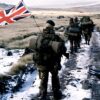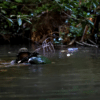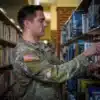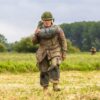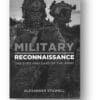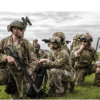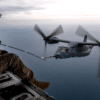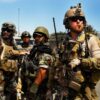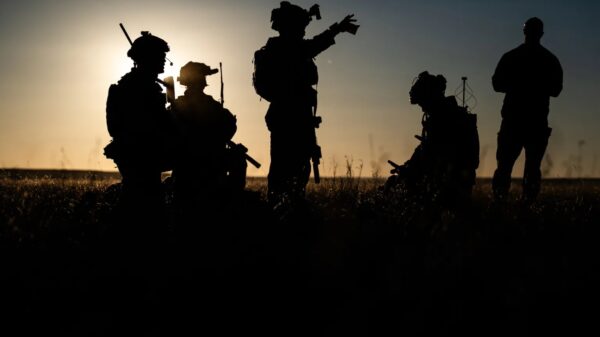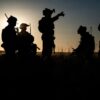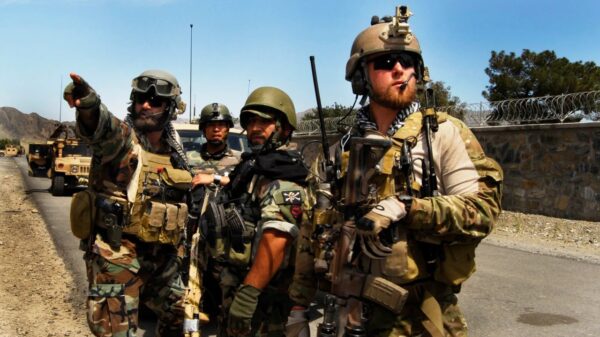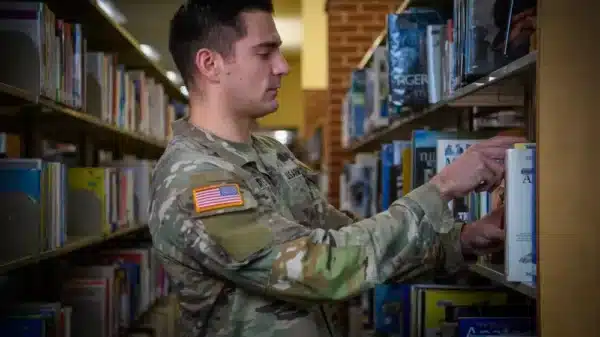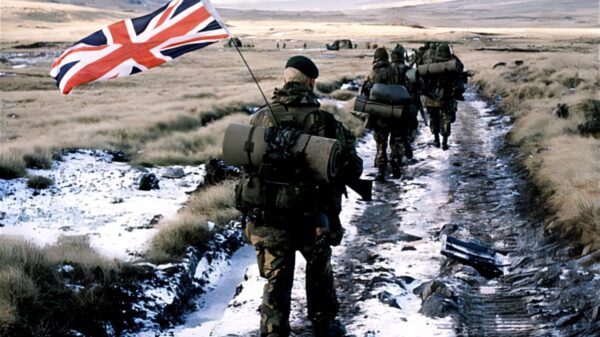Adam T. Biggs, Naval Special Warfare Command
Lanny F. Littlejohn, Naval Special Warfare Command
Introduction
Special operations forces (SOF) demand special attention due to the unique challenges and requirements faced by the community. As such, many efforts focus on developing capabilities to support these operations, ranging from enhanced human performance programs to doctrine that underpins a complex cycle of training and redeployment. One question strikes at the heart of all efforts and doctrine to utilize special forces in support of national defense: what is the purpose of special operations? Ask three different people, and you may get at least four different answers in return. For example, Navy SEALs devote significantly more time to training for amphibious operations than Army Rangers or Marine Corps Raiders. Still, the question of purpose goes beyond a requisite list of mission capabilities. Purpose demands a strategic vision that bridges the operational realities of today with the future state of operations required to defend the nation.
CONTACT LCDR Adam Biggs | adam.t.biggs.mil@socom.mil
The views expressed in this article are solely those of the authors and do not necessarily reflect the views, policy, or position of the Department of the Navy, Department of Defense, or the U.S. Government © 2024 Arizona Board of Regents/Arizona State University
The American theory of special operations is a critical piece of this strategic vision[i]. Its roots can be traced to warfare concepts such as relative superiority and Clausewitzian friction.[ii] As originally conceived, the core content revolved around premises and principles guiding the success of American special operations. Each stated proposition within the American theory expounds upon a concept critical to ongoing operations, including ideas such as emphasizing the value of the human element in warfare and the reliance of special operations on combat support services. Several ideas similarly overlap with the five SOF truths.[iii] However, the theory has not been directly linked to, nor translated into, doctrine. Nor is it without flaws—with one major flaw apparent in its namesake. Namely, although it is called an American theory, there is nothing uniquely American about it. The likely inspiration stems from observations primarily drawn from United States special operations. Pragmatic observations may produce a simple list of connected training principles, yet a list lacks synthesis and identity, leaving the American theory unable to answer critical questions. Is the U.S. success unique? What makes this theory different from other positions? Are some elements more central to the theory than others?
The primary purpose here is to identify the ethos underlying an American theory of special operations. Applying a philosophical purpose to this theory will underscore its message and define it among competing theoretical stances on special operations. In particular, the argument will focus on the philosophy of the individual, a core tenet of U.S. special operations that has implicitly guided selection and training throughout its history. Such foundational ideas will provide support and character to the development of the American theory and further set it apart from peer competitors.
The discussion will begin with an overview of the premises stated within the American theory. Next, the core philosophy of the individual will be presented in contrast to the SOF truth from which it is derived—special operations forces cannot be mass-produced. This contribution will be compared with other theoretical positions on special operations, as well as a debate on the value of theoretical inquiry in the field. Taken together, the goal is to advance the development of an American theory of special operations by proposing a foundational principle for its strategic vision.
Special operations represent a critical component of the military infrastructure, especially as the focus on strategic competition with peer and near-peer adversaries increases and integrated deterrence becomes a prime goal of US military strategy. Many explorations have examined the contributions of training procedures or the historical accomplishments of various SOF units. By contrast, theoretical evaluation delves into the purpose of special operations forces. Although there will be a later discussion about the relative value of theory in special operations,[iv] an early and highly influential theory of special operations is the theory of relative superiority.[v]
According to relative superiority, SOF personnel achieve a decisive advantage despite numerical inferiority by reducing the frictions of war, which represent the disparity between the actual and ideal performance conditions in combat[vi]. Chance and action interact to produce difficulties during conflict that may or may not be anticipated by military forces. With advanced training, specialized equipment, and small numbers, SOF personnel can reduce potential friction points to ensure higher-quality performance during missions. Other scholars have similarly sought to extend Clausewitzian ideas into SOF-specific contexts.[vii] Still, McRaven’s theory of relative superiority could be argued as the first, most fully formed, or at least the most influential theory describing the purpose of training and maintaining special operations personnel.
Recent discussions have attempted to expand upon the purpose and functions of special operations. Spulak[viii] and Kiras[ix] both explored the strategic contributions of SOF capabilities, which remain a critical consideration, but do not independently represent the type of theoretical contribution describing SOF functions as well as relative superiority. Another perspective builds upon foundations laid by McRaven’s theory of relative superiority, as well as the philosophy of SOF truths and SOF imperatives that define successful operations. This American theory of special operations “explains the nature, uniqueness, value, and application of this instrument of military power and the tensions that are inherent to it”.[x] Its full review outlines 26 premises and 14 principles that provide an intellectual framework for debating the future evolution of special operations. These principles incorporate several ideas put forth in the theory of relative superiority, which is, in part, why an American theory of special operations should be seen as founded upon the ideas of Admiral William McRaven.
There is an inherently intriguing reason to develop an American-specific theory. Although specialized military personnel have existed throughout the history of warfare, American personnel have achieved monumental successes through special operations with historic implications, most notably Operation Neptune Spear.[xi] The American concept has come to define what the world currently views as special operations. In turn, when developing a theory of special operations, it makes logical sense to explore the successes and occasional failures of the most successful organization. This approach likens theoretical explorations of special forces to developing theories of business and management, more so than the hypothesis-driven empirical sciences of chemistry or physics. Essentially, an American theory extracts factors common to success in special operations and interprets them as causal influences on operational success.
There is a logical flaw in this approach, however, as correlation does not equal causation. Despite the value in mining successful experiences of successful organizations for good behaviors and best practices, this approach describes what worked best in the past—not what will work in the future. There is some overlap between these concepts, yet the purpose of theoretical development for special operations has less to do with training successes today and more to do with anticipating future states that will ensure operational success tomorrow. Different theories provide contrasting ideas that enable critical thinking skills, thereby making the development and exploration of special operations theory essential for future operational success. Because the nature of special operations involves tackling emerging challenges and priorities, a retrospective-focused approach is insufficient without a more prospective integration of emerging challenges.
Another flaw is that the American theory largely describes a series of premises without truly synthesizing this information into an overarching concept. This method sometimes limits clarity because the premises overlap, if not become fully redundant. For example, the first two premises state that “special operations represent a distinct military capability of strategic value to national security” and “special operations have strategic utility”.[xii] These two premises appear to describe the uniqueness of special operations and their utility within the military structure, respectively, but they are insufficiently distinguished from one another. Additional analysis and synthesis will be necessary to refine the principles.
To compare where the theory currently stands in terms of educational development, Bloom’s taxonomy describes various educational levels based on learning objectives.[xiii] Earlier levels begin with knowledge and observation before progressing to synthesis and eventually creation. An American theory of special operations would currently be considered in the lower stages of this taxonomy, as the existing version lists a series of sometimes redundant premises with limited synthesis into a cohesive idea. Further synthesis would require aligning different premises within a suitable structure, such as connecting multiple premises to the first SOF truth: humans are more important than hardware. This delineation would emphasize the role of the human operator in special operations as a definitive dimension of the theoretical premises.[xiv] Despite the value in pursuing an American theory, this type of development remains a necessary next step.
The primary purpose of the current discussion is to explore one foundational problem with the American theory that requires refinement—its ethos. It is difficult to describe why an American theory is different from other positions, or even why its namesake should permit it to be described as an American theory. Our intent is to provide an answer to why we need an American theory. Once we have a characterization of the theory that differentiates it from other positions, further refinement of the premises and principles in future work will be possible. So, what makes this idea an American theory of special operations, and is the theory unique to the U.S. and its society?
Special Operations Forces Cannot Be Mass Produced—Or Can They?
There is no more compelling set of guiding philosophical principles in special operations than the five SOF truths. These truths provide a concrete, concise, and easily repeatable framework underscoring the myriad complexities that distinguish special operations from general-purpose forces. However, four of these truths address general issues related to the success of special forces. Although each has internal validity and influences the development of an American theory, one core truth defines the ethos of this theory more than the others: special operations forces cannot be mass-produced.
But why not?
The metaphorical comparison here is a pipeline. The volume of oil pumped from one end to the other depends on the length of the pipe and its diameter. These dimensions metaphorically represent the functional challenges in mass-producing competent special operations forces.
One possibility is the time investment required to produce special operations personnel. Any military force requires time to train and prepare its members for combat. Wars, most notably World War II, demonstrated that general-purpose military forces can be mass-produced. While the quality of the product may vary, the process itself is feasible. By comparison, special operations personnel require proficiency in a diverse set of specialized mission responsibilities, making it necessary for fully capable SOF units to undergo years of training. Hastening this process would inevitably degrade their ultimate capability.
In this metaphor, the length of the training pipeline illustrates the time required for special operations training, which extends the process of moving someone from recruit to Sailor to SEAL. However, the length of the training pipeline does not inherently diminish force capacity if the proper investments are made early in the training cycle. The length of the pipe does not dictate its diameter, and length alone does not prohibit mass production. To build a better force, a longer pipeline is often required.
Pushing the metaphor further, transcontinental pipelines exist to supply vast continents with oil and natural gas. Similarly, twelve-year-old scotch takes, by definition, twelve years to age, yet it can still be mass-produced and found in stores worldwide. Thus, the timeline is not, in and of itself, a prohibitive factor in mass production—it is a limiting factor, certainly, but not an insurmountable one. So why can’t special operations forces be mass-produced?
The first question of timeline leads naturally to a follow-up question about infrastructure. Mass production requires a robust investment in facilities and other resources. Special operations training demands significant material investments, including infrastructure to support explosive breaching, diving, and jump training under various conditions. Here, the diameter of the pipe in the metaphor represents the scope of resources required to support the process.
A larger pipeline capable of moving more material necessitates a more robust foundation. Returning to the transcontinental pipeline example, enormous amounts of material can be moved if the process is appropriately supported. The supporting elements, however, represent feats of engineering and logistical complexity that are daunting if starting from scratch. Yet logistical challenges, like timeline constraints, are not inherently prohibitive factors in mass production.
The American military-industrial complex, for instance, represents a similarly Herculean feat of funding and organization, and its existence proves that such investments are possible. Therefore, the mass production of special operations forces ultimately becomes a question of resource investment. While SOF personnel are limited by the quality of training and facilities available to them, with sufficient resources, a nation could theoretically establish programs to support robust special operations training.
So, neither timeline nor infrastructure alone sufficiently answers the question: why can’t special operations forces be mass-produced?
A more practical response might focus on the overall logistical burden. The complexity and scale of the required investment could render the process untenable or unsustainable as part of a national military strategy. This argument holds merit, yet for an American theory of special operations, it does not fully explain why American special operations adhere to the SOF truth that special operations forces cannot be mass-produced. Instead, a more philosophical argument underlies this truth and implicitly provides the ethos that differentiates the American theory from other special operations theories.
Philosophy of the Individual within an American Theory of Special Operations
Special operations cannot be mass-produced because there are individual elements inherent to the development of SOF personnel. The conceptual addition to an American theory of special operations can be described as the philosophy of the individual. This philosophy emphasizes several distinct components (see Table 1). Foremost, there must be quality in the initial product. Mass production is prohibited because there are insufficient materials to produce the desired end state of a trained special operator.
Next, the process of special operations development is an individual journey. Success or failure is a test of individual willpower that cannot be mass-produced, as every journey is different. Additionally, SOF personnel train as individuals first and then integrate and succeed as members of a team. The inherent contradiction between the individual process and the team mentality demands a level of individual investment for a selfless reward, which limits the pool of people who can succeed in these positions. Finally, the philosophy of the individual fosters diversity. Individual differences enable adaptability and the ability to overcome challenges in ways that best support relative superiority.
Since complex operational problems cannot be precisely forecasted before they arise, a diversity of approaches and perspectives within a team focused on a common goal allows for the improvisation that ultimately leads to success. U.S. special operations have benefitted from a spirit that embraces this concept as part of a national identity, uniquely situating U.S. forces to excel in special operations.
This combination—encapsulated in the philosophy of the individual—produces an ethos that distinguishes the American theory of special operations from its peers and fosters the desired operational effectiveness of special operations. Each aspect also contributes to the critical answer to why special operations forces cannot be mass-produced.
| Aspect of the Philosophy | Reason Special Operations Forces Cannot Be Mass-Produced |
| 1. Quality of product entering the training pipeline | Infrastructure and timeline limit production but do not preclude it. The real limitation lies in the quality of qualified candidates entering the pipeline. |
| 2. Special operations as an individual journey | Training depends on individual experience as much as infrastructure. Like education, outcomes vary based on effort and willpower. Mass production would dilute the process. |
| 3. Individual initiative produces team success | Team success depends on individual decision-making and selfless initiative. Mass production fails to foster the independence required for this mindset. |
| 4. Diversity fosters adaptability to produce operational success | Diverse experiences among operators drive innovation and adaptability. Mass production creates uniformity, undermining the ability to address unique challenges effectively. |
Table 1. Overview of the four components of the philosophy of the individual within the framework of an American theory of special operations.
The first step in the philosophy of the individual involves the quality of raw materials. In the pipeline metaphor, the length and diameter of the pipeline say nothing about the product entering it. Even if such an infrastructure has logistical burdens that might limit its application, a robust pipeline is inherently unnecessary if there are not enough materials to move from one end to the other. Diamonds, for instance, could theoretically be mass-produced since carbon is plentiful, but the material produced by the process is relatively rare in comparison. Similarly, special operations training faces the challenge of sufficient raw materials, which prohibits mass production.
The most obvious example of this challenge involves physical fitness. Many individuals capable of military service lack the physical fitness requirements necessary to enter the special operations training pipeline. While this reality precludes mass production of special operations forces, it is actually a byproduct of a more critical component of the American theory. After all, there is a distinction between the physical fitness capabilities (potential) of the human body and the physical fitness capabilities (actual) of the individual.
The second aspect precluding mass production is the crux of the American theory: special operations development depends on the individual journey. Someone must desire to become an operator enough to engage in physical training that sufficiently prepares them for the special operations pipeline. This process creates a self-selection among individuals who may desire the prestige of operator status versus those who have the willpower to become operators.
However, as evidenced by the attrition rates in special operations training, physical fitness and desire alone are insufficient to produce SOF personnel. Willpower and grit are the critical differentiators. The training itself is a test of the mind more than a test of the body—that is, the flesh can endure the process, but will mental fortitude buckle under the pressure? This aspect precludes mass production because each journey is unique. Consider the process akin to education, albeit with an emphasis on special operations. Educational systems allow high performers and hard workers to rise through the ranks, but applying the same teaching methods to every student does not yield the same outcomes.[xv] Education cannot be forced. It is the product of individual learning and volitional effort, rather than mass production. Even if many people receive an education from the same institution, individual education is always unique.
Special operators train in much the same way, where the result depends on individual initiative rather than mass production. Every moment of Hell Week in Basic Underwater Demolition and SEAL training (BUD/S) adds to the physical burden placed on the individual. However, the body can endure the training—a robust cadre of special operations medical personnel carefully observes and supports the process to ensure survivability. Instead, the challenge lies in individual willpower. No one else can do it for you. All candidates face the little voices telling them to quit, to go home, to take the easy route. The answers to these little voices cannot be mass-produced because the individual experience leading up to that point is different for every candidate.
This individual demonstration of willpower differentiates those who become SEALs from those who drop out. More importantly, the individual process and experience form the core—and the most crucial component—of the training pipeline. If an individual has the willpower to endure this experience, they have the willpower to become an operator. Late-night runs, freezing swims, and extreme exhaustion are merely tools to challenge the mind’s will. As such, special operations forces cannot be mass-produced because it is the individual reaction that matters. Experience and process can be mass-produced, much like any roller coaster experience, but an American theory of special operations emphasizes that the individual experience inherent to special operations training is what ultimately determines operational success.
The third aspect of this philosophy of the individual highlights how the process can succeed or fail due to either selflessness or hubris. Admiral William S. McRaven, then commander of USSOCOM, summarized the nature of this selflessness in a commencement speech where he described the value of making your bed every day.[xvi] Recalling his training anecdotes, Admiral McRaven spoke about a night spent in the mudflats between San Diego and Tijuana after his training class committed some “egregious” training infraction. The mud swallowed each man until only their heads bobbed above the surface. The instructors offered everyone a way out: the group could leave if only five men would quit, ring the bell, and leave SEAL training.
Several individuals wavered as they weighed the prospect of eight more hours in bone-chilling cold against the comfort of the easy path. Then, one voice began to sing. Another followed, and then another, and another. Admiral McRaven recalled how the mud began to seem a little warmer, and the dawn no longer felt so far away. This moment encapsulates the duality of special operations training. Individual willpower determines whether one becomes an operator, but the success of special operations depends on the team. No individual is as strong as the team. As Kipling aptly wrote: “For the strength of the pack is the wolf, and the strength of the wolf is the pack.”
Within an American theory of special operations, and according to the philosophy of the individual, success depends on individual initiative working within a team. In the mudflats example, individual initiative promoted team success. Every individual had the same experience while shivering in the mud, but one man decided to start singing. No one told him to sing. Loud, off-tune renditions of popular songs might seem like yet another environmental hazard in an already challenging situation. Even so, one person recognized the moment and chose to innovate—undertaking an action that would enable mission success.
The team succeeded because of this individual initiative. This person received no special accolades for the action but did it because team success mattered more than personal glory. An individual focus accepts that personal success is not always possible, yet individual initiative and sacrifice can drive team success. Would the same act have carried the same value if the class had been instructed to sing? Likely not. This selflessness is integral to success in special operations. Within the philosophy of the individual, success arises from the seeming contradiction of team success driven by individual initiative and selfless action.
Failure is also explained within this philosophy. A focus on the individual can lead to substantial hubris when this egocentric approach is not tempered by selfless attributes. A trained special operator may have succeeded where others failed, but when this accomplishment is pursued for personal glory, the result is entitlement. Entitled individuals seeking personal accolades create toxic environments. Conversely, individual achievement and initiative focused on team success foster a collaborative environment where the whole becomes greater than the sum of its parts—where team capabilities surpass the capabilities of any individual operator.
The fifth SOF truth—most special operations require non-SOF support—acknowledges the broader contributions of the team. An individual operator may possess incredible skills and qualifications, but personal success ultimately depends on team support. The potential failure carried by the philosophy of the individual is the toxic environment that arises when individual success takes precedence over team success. Both scenarios require individual initiative, yet one focuses on personal recognition, while the other centers on collective achievement. Admiral Wyman Howard, as Commander of Naval Special Warfare Command, best summarized the double-edged philosophy of the individual with the motto he signed at the end of every message: “The deed is all—not the glory.”
This combination of individual initiative and selfless focus on team success further precludes mass production. A suitably contradictory attitude for special operations under an American theory cannot exist among the masses. Moreover, achieving the status of a special operator does not inherently confer such an attitude upon the servicemember. Developing and fostering a culture that embraces this mindset is a focus on the individual, expressed through action, not something mass-produced through policy.
The fourth and final aspect of the philosophy of the individual explains why the American theory achieves such success in special operations: diversity. Specifically, mass production creates a uniform product, where one soup can is intended to be identical to the next, or the oil coming down the pipeline today is the same as the oil tomorrow. While this process creates volume, it also creates vulnerability. Enemies can anticipate and adapt to operational capabilities because they know in advance what they will encounter.Lateral thinking becomes a tool by which enemies can exploit the predictability of mass production.[xvii] Relative superiority demonstrates this principle: a numerically inferior force can achieve disproportionate results by applying relative strength at the optimal point of vulnerability.[xviii] Mass production creates organizational vulnerabilities in universal tactics and training—vulnerabilities that special operations are designed to exploit, not emulate.
Moreover, a powerful yet uniform force undermines the nature and function of special operations. There is philosophical debate about whether mass production contradicts the very definition of special operations and instead represents a shift in the training capabilities of general-purpose forces. For instance, modern infantry may well exceed the definition of special operations forces as understood during the World War II era.Instead, the philosophy of the individual posits that valuing the individual as the fundamental unit inherently promotes diversity within the force. Emphasizing the individual journey during training produces varied experiences among those who succeed. These individual skills can then be tailored to mission responsibilities for optimal advantage. Furthermore, diversity inherently fosters adaptability. Special operations will always face missions with emerging challenges that demand the ability to adapt and overcome. If a mass-production pipeline creates a mass-produced product with similar thinking patterns, it follows that responses to new situations will also be similar.
The result is that ten thousand people reach the same conclusion. Logistically, such uniform thought simplifies managing a large organization, but it also leads to innovative stagnation—the inability to adapt and overcome novel encounters—which is self-defeating in a special operations environment. Different perspectives generate different options, enabling a more holistic understanding of situations and a more complete evaluation of operational possibilities. Diversity drives innovation, and the ability to create new solutions for unexpected circumstances is a key factor in the success of special operations. An American theory of special operations embraces success through diversity by focusing on the experiences and capabilities of individuals rather than the mass-production capabilities of the training pipeline.
How US Culture Enabled the American Theory of Special Operations
Other theories exist to describe the nature of special operations. Each position offers a unique perspective on the value or role of SOF personnel, such as the importance of relative superiority[xix] or the strategic applications of SOF capabilities[xx]. Although the relative merits of these different positions could be discussed in turn, the purpose of creating a unique theory is to capture something fundamentally different about its tenets. These ideas have, over time, evolved into something entirely new. For an American theory of special operations, the philosophy of the individual provides a distinctive ethos that sets it apart from competing perspectives. This philosophy adds depth and distinction to the theory, but it does not fully explain its namesake. So, what makes this position an “American” theory?
A straightforward interpretation, based on the original monograph[xxi] suggests that the theory is named “American” because its evidence comes primarily from U.S. special operations. In this sense, the name reflects its nation of origin, much as a historian might describe a “Hellenistic theory” of phalanx formation rather than a “Roman theory.” We propose a different interpretation for the naming. The evidence may primarily derive from American sources not by coincidence, but because American culture aligns exceptionally well with the philosophy of the individual. This perspective suggests a unique origin for the name while also attributing the success of American special operations, in part, to the cultural and societal characteristics of the United States.
To understand this position, one must first recognize what makes the U.S. distinct from many other nations. Perhaps the most obvious link is the diversity of the American population, which directly ties into the diversity aspect of the philosophy of the individual. Few cultures involve such a wide array of people with different ethnic, religious, and social backgrounds. Even the American landscape is marked by a diverse array of terrains. Diversity is a core strength of the American experience. If diversity fuels adaptability, then the blending of perspectives and cultures inherent to the American experience generates an array of approaches to problem-solving that are nearly impossible to anticipate.
Operationally, this dynamic allows American operators to adapt to various viewpoints based on their interactions, making them inherently suited to novel conditions. This evolutionary “natural selection” of ideas, perspectives, and frameworks fosters a progressive refinement in operational power. Theoretically, this concept suggests that American operators embrace adaptive expertise over procedural expertise during training.[xxii] Adaptive expertise enables individuals to excel in both expected and unexpected conditions, while procedural expertise allows strong performance only within familiar or practiced conditions. Diversity underpins adaptation, and adaptive skill is arguably the most critical component of expertise.
This adaptability also carries an inherent tactical advantage: it is difficult to disrupt performance when operators can excel even as circumstances change. Disrupting a procedural expert is often a straightforward application of relative superiority, but disrupting adaptive experts poses a much greater challenge, especially when special operations personnel face true peer competitors—other special operations forces. Another point emphasizing the uniqueness of the American theory is that the U.S. is built primarily upon a spirit, rather than blood or soil. Unlike many nations whose identities are shaped by lineage or conquest, America’s identity revolves around an ideal—a belief in crossing oceans in pursuit of a better life. This ethos reflects individual initiative aimed at producing team success.
Despite the challenges of building a society composed of native-born citizens and immigrants from around the globe, the benefits to special operations are profound. Immigrants often carry a spirit of adventure and a willingness to seek change to improve their lives. This drive distills into the essence of the American spirit, which transcends being born in California or Texas. Moreover, the American Dream emphasizes upward mobility, offering abundant opportunities for prosperity and success.[xxiii] There is no entrenched class system dictating an individual’s social responsibilities. Instead, there is a pervasive belief that anyone can achieve anything through effort—and perhaps a bit of luck. These ideas align with the individual journey and opportunity central to the American experience.
An American theory of special operations embraces this individual journey to overcome adversity as a defining feature of its training philosophy. The combination of these cultural characteristics suggests that U.S. society is uniquely positioned to produce special operators who excel through adaptability and individual initiative.
This view offers a compelling, if optimistic, explanation for why American special operations have garnered such success and earned their reputation for combat prowess. However, the same cultural traits that have fostered this success also present risks. Failures in special operations training parallel some broader issues within American society. Individual initiative pursued for personal glory, rather than self-sacrifice, can lead to the kind of hubris often displayed across social media platforms. Such selfishness can fuel a cycle of toxicity and entitlement that undermines both special operations and the culture at large. The same cultural idioms that create an environment ripe for success could also serve as a blueprint for its potential downfall.
Future Development for an American Theory of Special Operations
Although the current discussion has focused on proposing ideas that establish an ethos underlying an American theory of special operations, it is important to emphasize that these ideas are intended to move the theory forward—they do not represent an endpoint. Special operations theory requires substantial additional exploration, and the American theory of special operations is merely one avenue for future consideration. Several critical considerations arise when addressing theoretical questions about special operations.
The foremost concern is the value of the theory itself. A debate exists regarding whether there should be an overarching theory of special operations or even a subset of theoretical emphasis.[xxiv] One position argues that “an emergent theory of special operations, or SOF power, particularly one sponsored by the special operations community, is an indicator of an expansion of bureaucratic confidence and political influence”.[xxv] The idea is that, if unchecked, special operations theories could risk promulgating myths or hyperbole, taking on political or conspiratorial tones. Applying the descriptive label of “theory” to something based solely on logical deduction risks elevating its perceived validity beyond its actual value. This critique highlights a potential pitfall in developing theoretical positions without sufficient empirical evidence.
Another challenge in developing theory is that special operations theory may be inherently self-limiting, or even self-defeating, given that special operations must remain at the cutting edge of warfare. Theory development builds on existing evidence and concepts, meaning that any current theory risks becoming outdated as new ideas and innovations emerge. Special operations theory could be considered analogous to the uncertainty principle: it is difficult to know the exact nature of a current capability and its future trajectory.[xxvi] The more precisely one examines current special operations capabilities, the more difficult it becomes to predict future trends, and vice versa. This analogy suggests that narrowly focusing on the present risks obscuring broader trends, while a more generalized approach may dilute the specificity needed to address the unique challenges of special operations.
However, there are counterpoints to these concerns. First is the issue of feasibility. Developing a theory of special operations is inherently complex, as the field encompasses a wide range of activities. Attempting to create one overarching theory of special operations is akin to creating a unified theory of psychology. Just as psychology includes multiple theories addressing specific topics—such as social learning[xxvii] or moral development[xxviii]—special operations theory should approach the field through focused, topic-specific frameworks. Individual theories might address areas such as training, selection, or operational methodologies, differentiating special operations from general military practices.
Second, theoretical debate in special operations serves an important purpose: fostering critical thinking within the field. Some knowledge is developed intuitively through individual experience, but such insights are often difficult to convey to others as more than anecdotal stories. The challenge lies in ensuring that the listener can extract the same value and meaning from these stories as the person who experienced them. By contrast, an instructor presenting a structured theory and illustrating it with a story allows students to gain a deeper understanding of the situation and apply that knowledge to future scenarios. In this sense, a “theory” provides a formal framework for organizing and communicating knowledge, making it more accessible and actionable. Developing theoretical postulates for special operations is thus an exercise in translating intuition into structured, teachable concepts. While this process carries risks, it offers significant value when the resulting theory is aimed at enhancing critical thinking around topics relevant to special operations.
These considerations underscore the challenges and opportunities of theoretical development in special operations. For an American theory of special operations, each of these points provides meaningful guidance. While speculative ideas should be approached with caution to avoid promoting myths, the primary purpose of an American theory should be to stimulate critical thinking on issues central to special operations. Such theories need not address every aspect of the field or apply universally across all missions and time periods. Instead, targeted theories focusing on specific aspects—such as the factors behind American special operations’ successes or the unique traits distinguishing U.S. SOF from other forces—can encourage creative thinking with practical implications for recruiting, selection, and training. The current discussion aims to enhance the American theory by providing it with a defining ethos. Further development could refine its premises or expand on the principles of McRaven’s theory of relative superiority. At its core, an American theory of special operations should highlight attributes unique to or heavily influenced by U.S. history and culture. Developing such a theory based on historical evidence from American special operations is just one of many potential approaches.
One intriguing area for future research is exploring whether there is something unique about U.S. culture that predisposes individuals to success in special operations. A potential avenue is examining how this cultural influence shapes the SOF mindset. As Johnsen and Christensen describe, “the term ‘SOF mindset’ has become a catchall term that encapsulates current enthusiasm and the notion that SOF has special qualities in terms of adaptability, risk tolerance, and dedication to mission success.”[xxix] Some individuals may enter training with a mindset conducive to success, while others develop it through training. The connection between cultural predisposition and individual mindset requires further scrutiny, considering both positive and negative implications—such as being goal-oriented but potentially resistant to authority.[xxx] While the SOF mindset is not unique to U.S. special operations, future research could examine whether U.S. culture predisposes individuals to this mindset, whether it is cultivated during training, or if success arises from a combination of the two. Investigating the SOF mindset represents a significant opportunity for further research, with implications for the philosophy of the individual and broader social science applications to special operations.[xxxi]
Summary
Special operations occupy a distinctive and critical role in U.S. military operations. Their unique characteristics introduce equally unique challenges in fostering the critical thinking needed to support these activities. The American theory of special operations offers one framework to encourage creative thinking in the field. Although this idea builds on McRaven’s theory of relative superiority, it requires significant further development. This discussion proposed an ethos underlying the American theory—the philosophy of the individual—which identifies key factors contributing to its uniqueness: 1) the quality of individuals entering the training pipeline, 2) the training process as an individual journey, 3) the interplay between individual initiative and team success, and 4) the value of diversity. Together, these elements explain the successes of U.S. special operations while drawing on American history and culture to support the theory. Each aspect reinforces why this framework should be called an American theory of special operations. Ultimately, any special operations theory should aim to enhance critical thinking within the field, thereby improving future operational performance.
Adam T. Biggs is a Lieutenant Commander in the Medical Service Corps, U.S. Navy, and currently serves as a Research Psychologist in the Military Population Health Directorate at the Naval Health Research Center in San Diego. He earned a Ph.D. in Cognitive Psychology from the University of Notre Dame and completed postdoctoral work at Duke University before commissioning in the U.S. Navy Medical Service Corps.
Lanny F. Littlejohn is a Captain in the U.S. Navy and currently serves as the Commanding Officer of Navy Medicine Readiness and Training Command in Charleston, South Carolina. He earned an M.D. from the University of South Carolina School of Medicine, an M.A. in National Defense and Strategic Studies from the U.S. Naval War College, and an MBA from the Naval Postgraduate School.
[i] Harry Yarger, 21st Century SOF: Toward an American Theory of Special Operations (MacDill Air Force Base, FL: Joint Special Operations University, 2013).
[ii] W. H. McRaven, Spec Ops: Case Studies in Special Operations Warfare: Theory and Practice (Novato, CA: Presidio Press, 1996). Carl von Clausewitz, On War, ed. and trans. Michael Howard and Peter Paret (Princeton, NJ: Princeton University Press, [1832] 1984).
[iii] J. M. Collins, U.S. and Soviet Special Operations, House Armed Services Committee (Congressional Research Service, Library of Congress: Washington, D.C., 1986). United States Special Operations Command, “SOF Truths,” accessed July 13, 2021, https://www.socom.mil/about/sof-truths.
[iv] James D. Kiras, “The Dangers of Theory,” in Special Operations Research: Out of the Shadows, ed. Christopher Marsh, James D. Kiras, and Patricia J. Blocksome (Boulder, CO: Lynne Rienner Publishers, 2020), 11–26. Christopher Marsh, Matthew Kenny, and Nicholas Joslyn, “SO What? The Value of Scientific Inquiry and Theory Building in Special Operations Research,” Special Operations Journal 1, no. 2 (2020): 89–104.
[v] W. H. McRaven, “Commencement Speech,” speech given at the University of Texas, May 17, 2014.
[vi] von Clausewitz, On War, 1984.
[vii] James D. Kiras, “A Theory of Special Operations: ‘These Ideas Are Dangerous,’” Special Operations Journal 1, no. 2 (2015): 75–88. G. S. Lauer, “Broken Windows: Special Operations and Clausewitz—Theory, Politics, and State Military Violence in the Limited Wars of the Twenty-First Century,” Special Operations Journal 5, no. 2 (2019): 103–110. R. Lillbacka, “Parameters of Simplicity as a Principle of Special Operations,” Special Operations Journal 3, no. 2 (2017): 94–110.
[viii] R. G. Spulak Jr., A Theory of Special Operations (MacDill Air Force Base, FL: Joint Special Operations University, 2007).
[ix] James D. Kiras, Special Operations and Strategy: From World War II to the War on Terrorism (New York: Routledge, 2006).
[x] Yarger, 21st Century SOF.
[xi] Mark Bowden, The Finish: The Killing of Osama bin Laden (New York: Atlantic Monthly Press, 2012).
[xii] Yarger, 21st Century SOF.
[xiii] Benjamin S. Bloom et al., Taxonomy of Educational Objectives: The Classification of Educational Goals. Handbook I: Cognitive Domain (New York: David McKay Company, 1956). David R. Krathwohl, “A Revision of Bloom’s Taxonomy: An Overview,” Theory into Practice 41, no. 4 (2002): 212–218.
[xiv] Alan Biggs and Robin Lee, “The Role of the Human Operator in the Third Offset Strategy,” Naval War College Review 71, no. 3 (2018): 96–120. Kristian L. Parker, “Locating the Human in Doctrine,” Special Operations Journal 3, no. 2 (2017): 88–93.
[xv] P. F. Cuthbert, “The Student Learning Process: Learning Styles or Learning Approaches?,” Teaching in Higher Education 10, no. 2 (2005): 235–249. Anthony F. Grasha, “A Matter of Style: The Teacher as Expert, Formal Authority, Personal Model, Facilitator, and Delegator,” College Teaching 42, no. 4 (1994): 142–149. Anthony F. Grasha and Natalia Yangarber-Hicks, “Integrating Teaching Styles and Learning Styles with Instructional Technology,” College Teaching 48, no. 1 (2000): 2–10. Frédéric Guay, Catherine F. Ratelle, and Julien Chanal, “Optimal Learning in Optimal Contexts: The Role of Self-Determination in Education,” Canadian Psychology/Psychologie canadienne 49, no. 3 (2008): 233.
[xvi] W. H. McRaven, “Commencement Speech,” speech given at the University of Texas, May 17, 2014.
[xvii] Edward de Bono, Six Thinking Hats (Boston: Little, Brown, 1985); Edward de Bono and Eric Zimbalist, Lateral Thinking (London: Penguin, 1970); Nicole Dobson-Keeffe and Warren Coaker, “Thinking More Rationally: Cognitive Biases and the Joint Military Appreciation Process,” Australian Defence Force Journal no. 197 (2015): 5–16.
[xviii] McRaven, Spec Ops.
[xix] McRaven, Spec Ops.
[xx] Robert G. Spulak Jr., A Theory of Special Operations (MacDill Air Force Base, FL: Joint Special Operations University, 2007).
[xxi] Yarger, 21st Century SOF.
[xxii] Arthur J. Baroody, “The Development of Adaptive Expertise and Flexibility: The Integration of Conceptual and Procedural Knowledge,” in The Development of Arithmetic Concepts and Skills: Constructing Adaptive Expertise Studies, ed. Arthur J. Baroody and Ann Dowker (Mahwah, NJ: Lawrence Erlbaum Associates, 2003), 1–44; Patrick Ward, Jonathan Gore, Ryan Hutton, Garry E. Conway, and Robert R. Hoffman, “Adaptive Skill as the Condicio Sine Qua Non of Expertise,” Journal of Applied Research in Memory and Cognition 7, no. 1 (2018): 35–50.
[xxiii] James Truslow Adams, The Epic of America (Boston: Little, Brown, and Company, 1931); Jim Cullen, The American Dream: A Short History of an Idea That Shaped a Nation (New York: Oxford University Press, 2004); Robert D. Putnam, Our Kids: The American Dream in Crisis (New York: Simon and Schuster, 2015).
[xxiv] James D. Kiras, “A Theory of Special Operations: ‘These Ideas Are Dangerous,’” Special Operations Journal 1, no. 2 (2015): 75–88; Christopher Marsh, Matthew Kenny, and Nicholas Joslyn, “The Value of Theory,” in Special Operations Research: Out of the Shadows, ed. Christopher Marsh, James D. Kiras, and Patricia J. Blocksome (Boulder, CO: Lynne Rienner Publishers, 2015), 27–46; Christopher Marsh, James Kiras, and Patricia Blocksome, “Special Operations Research: Out of the Shadows,” Special Operations Journal 1 (2015): 1–6; Christopher Marsh, James D. Kiras, and Patricia J. Blocksome, eds., Special Operations: Out of the Shadows (Boulder, CO: Lynne Rienner Publishers, 2020).
[xxv] James Kiras, “The Dangers of Theory,” in Special Operations Research: Out of the Shadows, ed. Christopher Marsh, James D. Kiras, and Patricia J. Blocksome (Boulder, CO: Lynne Rienner Publishers, 2020), 11–26.
[xxvi] Werner Heisenberg, “Über den anschaulichen Inhalt der quantentheoretischen Kinematik und Mechanik” [About the Graphic Content of Quantum Theoretic Kinematics and Mechanics], Zeitschrift für Physik 43 (1927): 172–198; Masanao Ozawa, “Position Measuring Interactions and the Heisenberg Uncertainty Principle,” Physics Letters A 299, no. 1 (2002): 1–7; Masanao Ozawa, “Universally Valid Reformulation of the Heisenberg Uncertainty Principle on Noise and Disturbance in Measurement,” Physical Review A 67, no. 4 (2003): 042105.
[xxvii] Albert Bandura and Richard H. Walters, Social Learning Theory, vol. 1 (Englewood Cliffs, NJ: Prentice Hall, 1977).
[xxviii] Jeremy I. M. Carpendale, “Kohlberg and Piaget on Stages and Moral Reasoning,” Developmental Review 20, no. 2 (2000): 181–205. Lawrence Kohlberg and Richard H. Hersh, “Moral Development: A Review of the Theory,” Theory into Practice 16, no. 2 (1977): 53–59. Jean Piaget, “Piaget’s Theory,” in Piaget and His School, ed. A. Scharmann, 11–23 (Berlin: Springer, 1976).
[xxix] Aksel Johnsen and Geir Christensen, “Clarifying the Antisystemic Elements of Special Operations: A Conceptual Inquiry,” Special Operations Journal 2 (2016): 106–123.
[xxx] Annette Dalgaard-Nielsen and Kristoffer F. Holm, “Supersoldiers or Rulebreakers? Unpacking the Mind-Set of Special Operations Forces,” Armed Forces & Society 45, no. 4 (2019): 591–611.
[xxxi] Eyal Ben-Ari, John G. Turnley, and Kobi Michael, “A Social Scientific Agenda for the Study of Special Operations Forces,” in Special Operations Forces in the 21st Century, ed. Jessica Glicken Turnley et al. (London: Routledge, 2017), 285–301.


